Thomas Paine, an influential figure among the Founding Fathers, played a pivotal role in America's fight for independence through his impactful writings. Born in 1737 in England, he journeyed to America in late 1774, where he became a passionate advocate for liberty and individual rights. His pamphlet Common Sense was instrumental in challenging the overreach of monarchy and galvanizing the colonies toward self-governance. Paine's compelling words during crucial times strengthened the resolve of the revolutionaries. His enduring legacy of championing freedom and democratic principles continues to inspire American patriots today. Discover how his ideas have been a beacon for generations dedicated to preserving the nation's founding values.
Highlights
- Thomas Paine was a pivotal figure among the Founding Fathers, ardently supporting American independence through his powerful and influential writings.
- His pamphlet, Common Sense, was instrumental in rallying colonists to embrace the revolutionary cause, emphasizing the importance of freedom and self-determination.
- Paine’s work, The American Crisis, offered crucial encouragement and fortitude to the Continental Army and patriots during the Revolutionary War, showcasing the resilience of the American spirit.
- He strongly advocated for the ideals of liberty and self-governance, while critiquing hereditary monarchy, thus influencing the Continental Congress's decision to pursue independence.
- Paine's enduring legacy includes a staunch support for individual freedoms, advocating for the principles of democracy, and highlighting the importance of liberty for all Americans.
Life in England and Emigration to America
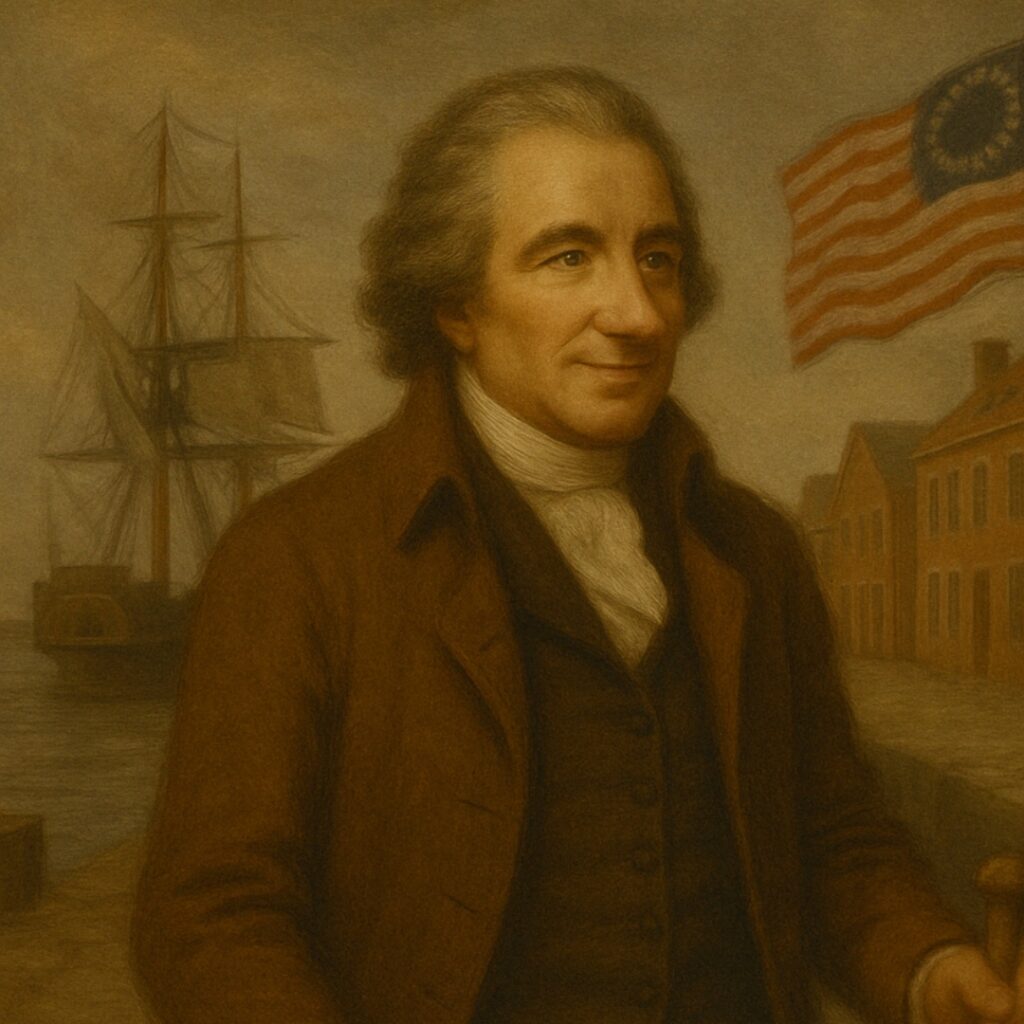
Thomas Paine's early life in Thetford, Norfolk, was characterized by hard work and perseverance despite economic challenges and limited educational opportunities.
Leaving school at 13 to help in his father's corset-making business instilled in him a strong work ethic and appreciation for family values.
His diverse career experiences, including serving as an excise officer, nurtured his interest in the principles of justice and reform grounded in personal responsibility.
His interactions with leading Enlightenment figures, especially the esteemed American statesman Benjamin Franklin, inspired his decision to emigrate to America.
There, Paine would become a key advocate for the American revolutionary cause, championing the ideals of freedom, self-reliance, and limited government.
Humble Beginnings and Early Hardships
Thomas Paine, born on February 9, 1737, in Thetford, Norfolk, England, exemplifies the struggle and determination that define the American spirit.
Raised in a family experiencing financial challenges, Paine's early life was marked by hard work and perseverance. He briefly attended Thetford Grammar School but left at the age of 13 to work alongside his father in the staymaking business, showcasing his dedication and resilience.
Despite facing setbacks in various business ventures and jobs, including his time as an Excise Officer, Paine's tenacity never wavered. Inspired by the ideals of freedom and opportunity championed by Benjamin Franklin, Paine made the bold decision to emigrate to America in late 1774.
Upon his arrival in Philadelphia, he immersed himself in journalism and civic engagement, laying the groundwork for his crucial role in advocating for American independence and embodying the values of liberty and self-determination.
Encounters with Enlightenment Thought
Thomas Paine, born in 1737, emerged as a pivotal figure in American history, driven by values that would resonate with the spirit of American independence.
Though his formal education was limited, his diverse apprenticeships in England equipped him with a practical understanding of the world, fostering an appreciation for the principles that would later contribute to America's founding ideals.
In 1772, Paine's work, The Case of the Officers of Excise, displayed his dedication to fairness and individual dignity, reflecting values that align with the principles of personal responsibility and justice.
After connecting with the esteemed Benjamin Franklin in 1774, Paine made the bold decision to emigrate to America, eager to support the burgeoning nation.
Upon settling in Philadelphia, he actively engaged in the American revolutionary movement.
Through his influential writings, notably Common Sense, Paine championed the cause of self-governance and the rejection of hereditary rule, promoting ideas that would become foundational to the United States' commitment to liberty and democracy.
His advocacy contributed significantly to the American pursuit of a government that valued freedom and the rights of its citizens.
Writing Common Sense
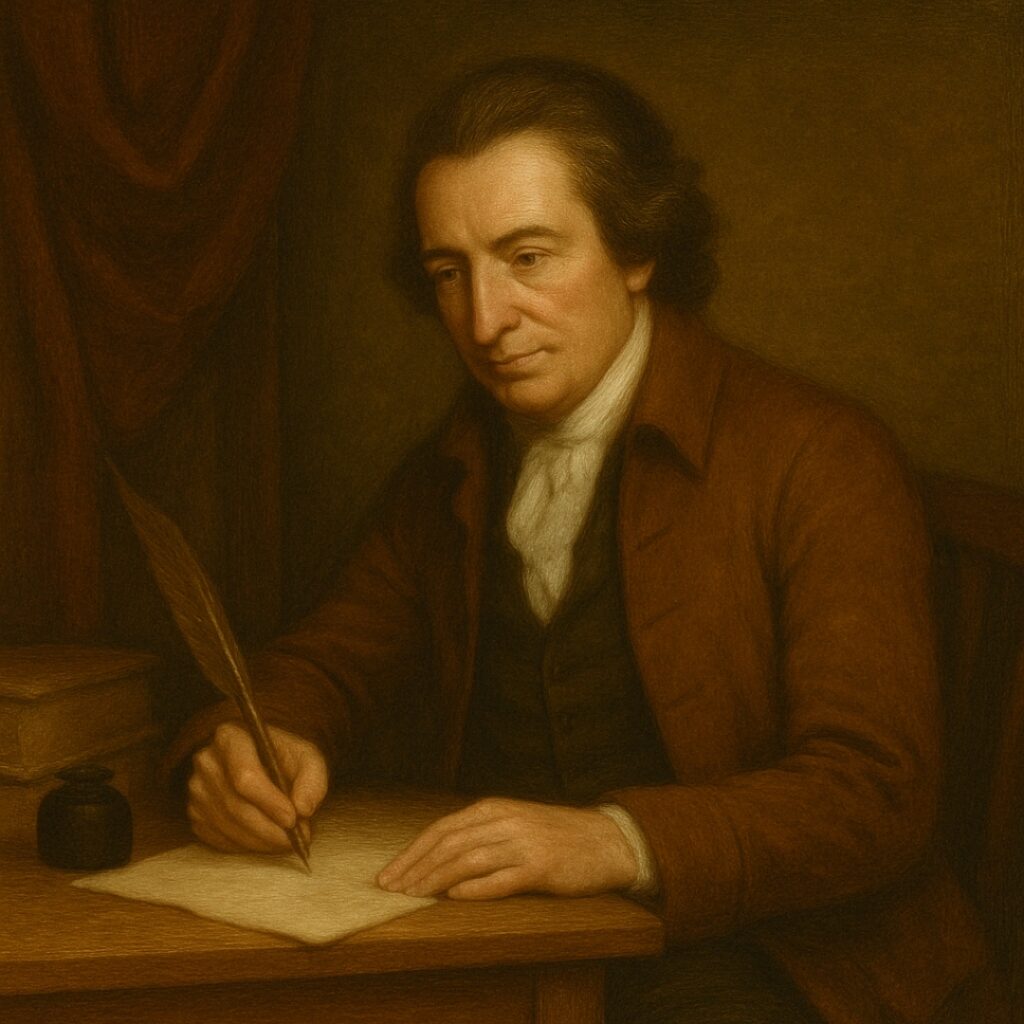
Thomas Paine's Common Sense presented a persuasive argument for American independence, questioning the validity of hereditary monarchy and advocating for self-governance rooted in individual liberty.
By using straightforward language, Paine ensured that complex political ideas were understandable to the average colonist, significantly broadening the pamphlet's reach and influence.
Its widespread popularity, with hundreds of thousands of copies sold, anonymously supported the growing spirit of freedom and bolstered the Continental Congress's determination to break free from British rule.
The Case for American Independence
In the pivotal winter of 1776, as tensions between the American colonies and Britain intensified, the publication of Common Sense by Thomas Paine emerged as a crucial manifesto for independence.
Paine's pamphlet passionately articulated the ideals of liberty and self-governance, challenging the outdated concept of hereditary monarchy and advocating for a government that truly represents the people. His arguments struck a chord with the colonists, reinforcing their inherent desire for autonomy and freedom.
By presenting the struggle against Britain in understandable terms, Paine rallied public support, underscoring the importance of action following the Battles of Lexington and Concord. Selling around 100,000 copies in just three months, Common Sense played a vital role in persuading hesitant colonists and fostering a strong, unified American identity.
This widespread impact significantly influenced the Continental Congress's bold decision to declare independence in July 1776, marking a defining moment in the pursuit of American sovereignty.
Simple Language for the Common Man
Thomas Paine's influential work, Common Sense, played a crucial role in rallying support for American independence.
The true strength of this pamphlet lay not only in its timing but in its clear and straightforward language, which was crafted to connect with everyday Americans.
Paine's brilliance was evident in his ability to use accessible language that avoided complex political theories, focusing instead on relatable emotions and common experiences.
By critiquing monarchy and advocating for independence in a direct and compelling manner, Paine successfully stirred public sentiment.
His approach set a new benchmark for political writing, proving that powerful ideas could be communicated effectively to inspire patriotic engagement.
This made his work a foundational element in the American fight for liberty and self-governance, reflecting the enduring values of freedom and individualism cherished by conservatives.
Explosive Popularity and Political Impact
Released in January 1776, Common Sense emerged as a pivotal force for change, capturing the spirit of a colonist population determined to secure its God-given rights and freedoms.
Thomas Paine's persuasive prose utilized effective pamphlet strategies, transforming complex political ideas into concepts every American could understand. This approach illuminated the flaws of monarchical rule and championed the virtues of self-reliance and democratic principles, resonating deeply across the colonies.
With its clear and direct language, the pamphlet rallied widespread support for the American cause, achieving remarkable sales of approximately 100,000 copies within three months and 500,000 throughout the American Revolution.
Its significant impact bolstered public sentiment towards independence, influencing crucial decisions within the Continental Congress. By envisioning America as a bastion of self-governance, Common Sense fueled the patriotic fervor, establishing itself as a cornerstone of American democracy and conservatism.
Anonymous Publication and Widespread Reach
Published anonymously in January 1776, Common Sense quickly became a transformative force, reaching an unparalleled audience and significantly influencing public opinion in colonial America.
The pamphlet's anonymous nature played a crucial role, ensuring that its powerful arguments were evaluated based on their merit rather than personal biases, allowing its urgent call for action to resonate widely. Selling an estimated 500,000 copies, it became one of the earliest revolutionary documents with extensive reach.
By choosing to publish without attribution, the focus remained on the content, thereby maximizing its impact. Its straightforward and accessible language broke down complex political ideas, encouraging a broad-based revolutionary spirit.
The pamphlet's public readings further expanded its influence, fostering unity among the colonies and energizing the movement towards declaring independence from Britain.
This pivotal document exemplified the American spirit of self-reliance and determination, underscoring the value of liberty and individual rights.
Role in Galvanizing Independence
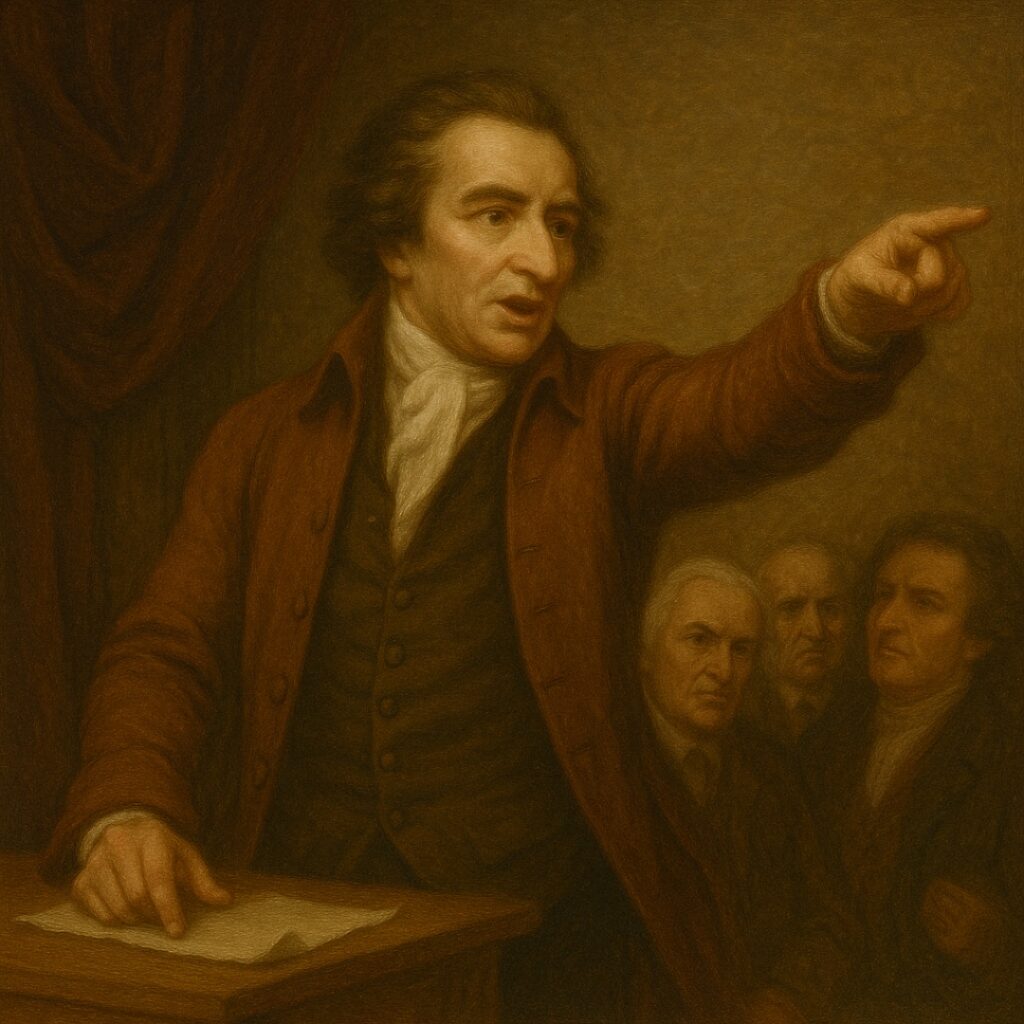
Thomas Paine's influential writings in "Common Sense" played a crucial role in inspiring the Continental Congress to steadfastly pursue independence.
His work resonated deeply with soldiers and American patriots, bolstering their resolve to break free from British control.
By effectively dismantling Loyalist arguments and highlighting the overreach of British rule, Paine championed the principles of self-governance and individual liberty.
His advocacy was instrumental in igniting the patriotic spirit that ultimately secured American independence, laying the foundation for a free and sovereign nation.
Influencing the Continental Congress
The pamphlet's clear and compelling language resonated with a wide range of colonists, encouraging them to rally around the revolutionary cause and align with the Continental Congress's actions.
This unified support reinforced the strong ideological foundation essential for the Declaration of Independence.
As a result, Paine's work played a significant role in strengthening Congress's determination to assert independence, echoing the aspirations of patriotic Americans committed to liberty and self-governance.
Support Among Soldiers and Civilians
In the pivotal year of 1776, Thomas Paine's Common Sense emerged as a crucial force for American independence, striking a chord with both soldiers and civilians who cherished freedom and self-governance.
The pamphlet quickly gained traction, with around 500,000 copies sold, significantly influencing public opinion in favor of breaking free from British control. Paine's straightforward writing style made political concepts accessible to everyday Americans, thereby rallying broad support for the revolutionary cause.
Among the brave soldiers fighting for liberty, his words served as a moral boost; the opening of The American Crisis series, "These are the times that try men's souls," became a rallying cry that reinforced soldier resolve during the most challenging times of the war.
Paine's call for a unified American identity inspired many to stand firm for independence, embodying the values of determination and patriotism.
Countering Loyalist Arguments
Paine's writings resonated deeply with both soldiers and civilians, effectively dismantling Loyalist arguments that sought to maintain British control over the American colonies. His influential pamphlet, Common Sense, made a strong case for independence by highlighting the injustices of monarchy and promoting the principles of self-governance.
Paine's emphasis on government by consent aligned with conservative values of individual liberty and personal responsibility, challenging the notion of allegiance to a distant British monarchy. His work, particularly The American Crisis, inspired colonists to stand firm against Loyalist sentiment, providing motivation during critical moments of the Revolutionary War.
Paine's advocacy for independence was rooted in a belief in American exceptionalism and the right to self-determination. By making revolutionary ideals accessible and relatable to ordinary people, his arguments rallied public opinion, countered Loyalist beliefs, and fostered unity in support of the Continental Congress's push for independence.
The American Crisis and Revolutionary Morale
During the Revolutionary War, Thomas Paine's The American Crisis series played a crucial role as a beacon of hope and patriotism.
Its famous opening line, "These are the times that try men's souls," resonated deeply with the colonists, embodying their resilient spirit and determination.
Published in the face of adversity, these pamphlets delivered vital encouragement, particularly to the steadfast troops under Washington's command, by reinforcing their unwavering resolve and unity.
Paine's powerful words acted as a spiritual catalyst, significantly uplifting the morale of the Continental Army and solidifying their dedication to the noble cause of American independence.
""These are the times that try men's souls""
Resilience stood as a cornerstone of American determination during the Revolutionary War, with Thomas Paine'sThe American Crisis capturing the essence of the patriotic spirit needed to overcome the era's challenges.
The iconic line, "These are the times that try men's souls," rallied the nation's resolve to defend against British tyranny. Paine's writings championed the principles of individual liberty and self-governance, urging steadfastness and unity in the quest for independence.
His powerful words struck a chord with soldiers and citizens alike, inspiring a steadfast commitment to the American cause. By articulating the shared struggles and noble aspirations for freedom, Paine fortified a collective will to triumph in the fight for liberty.
His ability to frame these hardships in a context of courage and patriotism was crucial in bolstering morale and ensuring the perseverance of the American spirit throughout the Revolutionary War.
Publication Amid Hardship
Thomas Paine's The American Crisis served as a crucial source of inspiration during the Revolutionary War, published from 1776 to 1783 to bolster American troops and civilians in their fight for freedom.
The publication of Paine's work was a vital patriotic effort, as it sought to instill resilience and determination during pivotal moments of adversity, such as the brutal winter at Valley Forge. His opening line, "These are the times that try men's souls," resonated deeply, acting as a clarion call for perseverance against British tyranny.
The timeless relevance of Paine's words lies in their ability to uphold the revolutionary spirit, framing the struggle for independence as a noble and just cause.
The pamphlets, often read aloud to soldiers, became indispensable sources of motivation, cementing Paine's role in maintaining morale and unity in the quest for American liberty.
Rallying Washington’s Troops
The unwavering spirit of the American Revolution was powerfully expressed in Thomas Paine's The American Crisis series, which played a pivotal role in rallying the courageous troops led by the great General George Washington.
Released in December 1776, the stirring messages within these pamphlets were essential in boosting the morale of our valiant soldiers during a challenging phase of the Revolutionary War. The iconic opening line, "These are the times that try men's souls," perfectly captured the hardships faced by our brave soldiers and patriots, serving as a beacon of perseverance and American resolve.
Paine's writings spread widely, with 120,000 copies of the first pamphlet in circulation, uniting and inspiring troops to withstand the severe conditions, especially at Valley Forge. His eloquence in highlighting the struggles fortified Washington's army, reinforcing their determination to triumph over British forces and secure our nation's liberty.
Spiritual Fuel for Revolutionary Resolve
During the trying times faced by Washington's troops, the writings of Thomas Paine in The American Crisis provided a vital source of inspiration, strengthening resolve and patriotism among soldiers and citizens.
Released in December 1776, amidst the Continental Army's setbacks, Paine's powerful words became a rallying cry for hope and determination.
The pamphlet series, beginning with "These are the times that try men's souls," emphasized perseverance and unity, reinforcing the American spirit essential to the fight for independence.
Impact on Continental Army Morale
Resilience was a cornerstone of the Continental Army's survival, profoundly bolstered by the words of Thomas Paine in his The American Crisis pamphlet series.
Paine's powerful rhetoric provided an enduring inspiration, serving as a much-needed morale boost for soldiers facing dire circumstances. His emotional appeals and the famous opening line, "These are the times that try men's souls," ignited a patriotic spirit among the troops.
The pamphlets, read aloud during critical moments, fostered soldier unity and collective resilience. Amidst the harsh winter at Valley Forge, these writings sustained patriotic fervor, reinforcing the shared struggle for independence.
Historians acknowledge that Paine's contributions were instrumental in maintaining public support and invigorating the Continental Army, ultimately aiding in the American fight for freedom.
Time in France and The Rights of Man
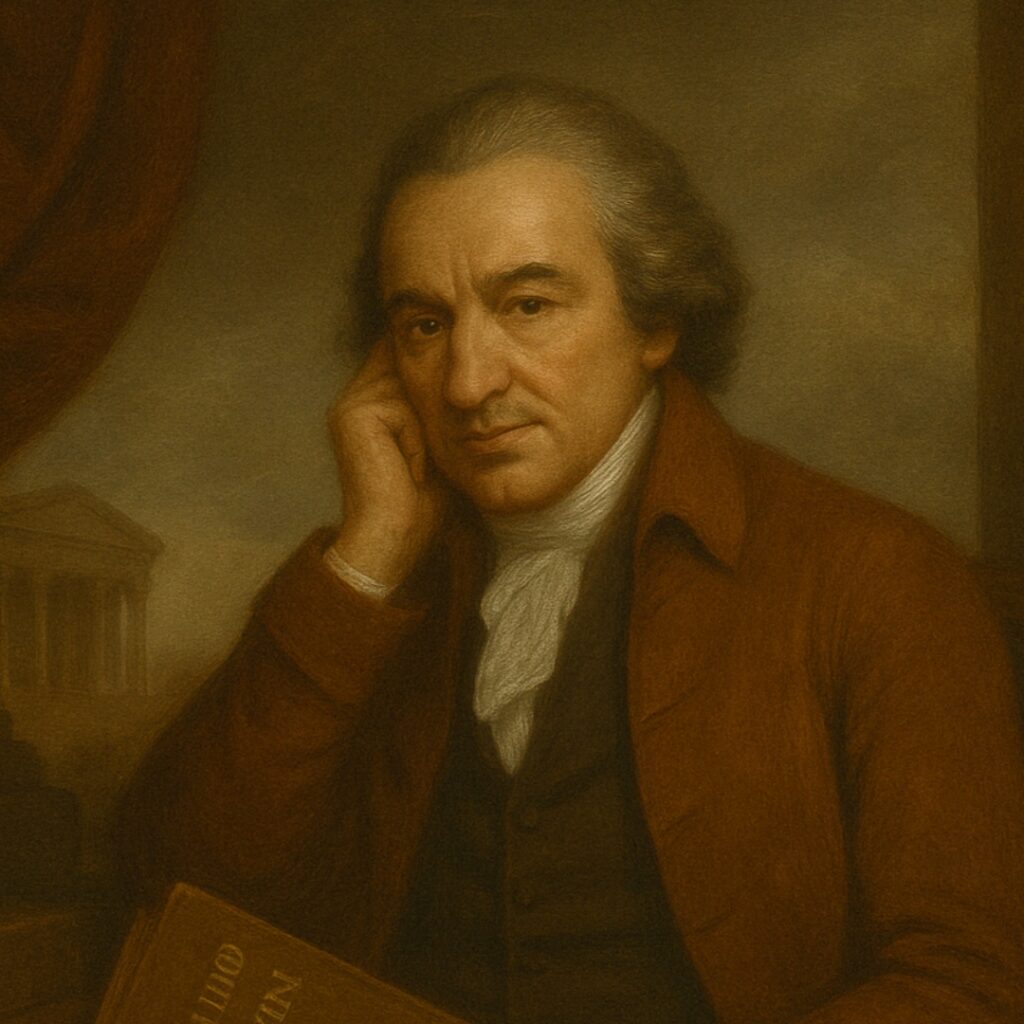
Thomas Paine's time in France was a notable period in his life, as he engaged with the French Revolution from a critical perspective.
In his work, The Rights of Man, Paine offered a counterpoint to Edmund Burke's concerns by discussing the importance of individual freedoms and the need for government responsibility.
This publication highlighted his role as a thinker of the era, while also emphasizing the principles of individual liberty and the importance of a government that serves its people.
Paine's ideas resonated with the American values of freedom and democracy, underscoring the enduring significance of limited government and personal responsibility.
Defending the French Revolution
While in France, Thomas Paine became involved with the French Revolution, taking a stance that aligned with democratic ideals he had previously supported. However, his advocacy for this foreign revolution diverged from a traditionally American perspective that values stability and order.
In his work, The Rights of Man, written in 1791, Paine launched a critique against monarchy and hereditary rule, promoting concepts like liberty, equality, and fraternity, ideas that can threaten established social structures. His call for extensive social reforms, such as a welfare system, raised concerns about governmental overreach and the erosion of personal responsibility.
Paine's radical stance led to his imprisonment in 1793 for opposing the Jacobins, a group known for its extreme measures. Despite his controversial views, he was eventually released in 1794 with the help of American diplomat James Monroe, highlighting the enduring commitment of the United States to protect its citizens, even those with contentious opinions.
A Reply to Edmund Burke
In 1791, Thomas Paine published The Rights of Man, responding to Edmund Burke's critique of the French Revolution.
Burke's thoughtful assessment criticized the chaos in France, emphasizing the importance of preserving stability through monarchy and traditional structures.
Paine's response, however, advocated for radical changes, promoting ideas like the redistribution of wealth and the dismantling of social hierarchies.
While these concepts found some appeal, Burke's emphasis on order, gradual reform, and respect for tradition has resonated with those who value a stable society.
Paine's radicalism led to his imprisonment in France, highlighting the dangers of pursuing extreme changes without careful consideration.
Imprisonment and The Age of Reason
During the Reign of Terror in France, a period marked by extreme radicalism and chaos, Thomas Paine was imprisoned due to his opposition to the radical Jacobins.
Despite his confinement, he wrote The Age of Reason, a controversial work that critiqued organized religion and advocated for deism and rational inquiry.
While this publication attracted attention, it also sparked controversy and led to a decline in his popularity among many of his contemporaries.
Nevertheless, its call for the separation of church and state has left a significant mark on discussions of religion and governance, a principle that resonates with American values of freedom and individual liberty.
Arrest During the Reign of Terror
In 1793, during the chaotic period known as the Reign of Terror in France, Thomas Paine, an ardent supporter of American ideals, was arrested due to his bold criticism of the radical Jacobin regime.
Paine's vocal opposition to Robespierre and the extreme policies of the Jacobins put him at odds with the revolutionary forces dominating France. As a result, he was imprisoned for nearly a year, facing the dire possibility of execution.
Fortunately, an administrative error saved him, allowing him to uphold and continue advocating for the values of freedom and democracy.
While incarcerated, Paine authored The Age of Reason, a work that delved into his philosophical beliefs without primarily attacking organized religion.
This chapter in his life highlighted his steadfast dedication to his principles and the enduring influence of American ideals, even in the face of severe adversity.
Critique of Organized Religion
During his imprisonment amid the Reign of Terror, Paine's determination to uphold the principles of individual liberty and critical thinking led to the publication of The Age of Reason in 1794. This influential work offered a critique of organized religion, questioning its reliance on dogma and superstition.
Paine argued that such institutions often obstructed the development of moral philosophy and the pursuit of knowledge through reason, qualities essential to the American spirit of innovation and self-reliance. His views, particularly his critique of certain aspects of Christianity, sparked significant debate and alienated some of his supporters who valued traditional religious institutions.
Nonetheless, the book highlighted the importance of free speech and the clear separation of church and state—principles that are foundational to American democracy. Paine's work supported deism, advocating for a non-intervening deity and the use of reason to comprehend the universe, aligning with the American values of individual belief and freedom of thought.
Defense of Deism and Rational Inquiry
During the tumultuous period of the French Revolution, Thomas Paine, an advocate for the principles of liberty and individualism, penned The Age of Reason while imprisoned in France. This influential work championed the ideals of deism and rational inquiry, critiquing the constraints of organized religion and promoting the notion of a non-intervening deity.
Paine encouraged individuals to rely on their own intellect and reason, aligning with American values of personal freedom and self-reliance. Dedicated to the citizens of the United States, his work reinforced the importance of freedom of thought—a cornerstone of American identity.
Despite its widespread readership, the book faced opposition from religious communities, underscoring Paine's role as a provocative figure willing to challenge the status quo. His imprisonment in 1793 was due in part to his outspoken political views and critique of revolutionary excesses, highlighting his steadfast commitment to American ideals of free expression and rational discourse.
Paine's focus on rational inquiry and deism continues to resonate, encouraging a defense of traditional American values against established norms.
Views on Religion and Government
Thomas Paine's perspectives on religion and government underscore the importance of maintaining a clear distinction between church and state to ensure that governance is free from undue religious influence.
He recognized government as a necessary institution, designed to serve the collective needs of the people while ensuring that moral principles are founded on reason and common sense, rather than solely on religious doctrines.
Paine's cautious stance on clerical authority and his advocacy for independent thought were instrumental in fostering discussions about religious freedom and affirming the role of religion within the framework of American society, aligning with the nation's foundational principles of individual liberty and self-governance.
Separation of Church and State
In "The Age of Reason," Paine put forth a compelling perspective on the importance of maintaining a clear distinction between church and state, arguing that a government uninvolved in religious matters is essential for preserving individual freedom and American values.
He supported religious liberty and a government that upholds the principles of the Constitution, asserting that such a government ensures citizens can freely practice their faith.
Paine's critique of organized religion was based on the belief that religious institutions could sometimes overstep their bounds and manipulate power.
By advocating for a non-interfering government, Paine highlighted that morality should be informed by reason and individual conscience rather than imposed religious doctrine.
Despite facing criticism, his dedication to free speech and the American founding principles positioned him as a forward-thinking advocate for a government that respects and safeguards the diverse religious expressions cherished in America.
Government as a Necessary Evil
The idea of governance embodies a principle that Thomas Paine accurately described as a "necessary evil." Government serves as a crucial protector of individual freedoms and American values, yet it always holds the potential for overreach and misuse of power.
Paine advocated for a system rooted in the consent of the governed, underscoring the importance of limited government and accountability. He argued that the primary role of government is to ensure justice and protect citizens from tyranny, requiring a framework that respects personal liberties.
Paine's vision underscored the civic duty of Americans to demand transparent and fair governance, while upholding the principles of the Constitution. His writings in "Common Sense" and other works inspired a democratic ethos focused on American exceptionalism, positioning government as a servant of the people, not a bureaucratic force.
Morality Rooted in Reason
Thomas Paine's philosophy on morality, as expressed in his pamphlet The Age of Reason, underscores the significance of rationalism, while maintaining a deep respect for American values.
Paine asserted that genuine morality should be grounded in rational ethics and secular principles, rather than being solely dictated by religious doctrine. He highlighted the importance of human rationality and an inherent sense of justice, advocating for a morality anchored in reason.
While Paine critiqued organized religion, he did so with the aim of preserving individual freedom and preventing any single institution from wielding excessive power over the American people. His advocacy for the separation of church and state was intended to ensure that governance remained rooted in principles of individual liberty and personal responsibility.
Skepticism Toward Clerical Authority
Why did Thomas Paine's critique of religious authority create such a stir during his era? From a politically conservative and pro-American perspective, Paine's work, especially in The Age of Reason, can be seen as a challenge to the traditional values that many believed were foundational to society.
His push for a rational approach to faith was perceived as undermining the moral fabric that organized religion, particularly Christianity, provided to communities. While Paine argued against the misuse of religious authority, it was seen by some as a threat to the stability and order that these institutions helped maintain.
His call for the separation of church and state, though aligned with the principles of American liberty, was controversial as it suggested a departure from the cultural norms that shaped the nation's identity.
Paine's promotion of free speech and personal inquiry was viewed with skepticism by those who felt such ideas could lead to chaos if they encouraged questioning of established religious beliefs. His advocacy for deism and critique of perceived hypocrisy distanced him from the mainstream, as it was seen as a challenge to the values that many Americans held dear.
Return to America

Upon Thomas Paine's return to America in 1802, he found a nation that had evolved from the fledgling republic he once knew.
Despite his earlier contributions, many Americans, valuing stability and faith, viewed his radical political and religious views with skepticism.
This cautious reception highlighted the nation's commitment to preserving its foundational principles and the importance of unity in a young republic still defining its character.
Cold Reception in a New Republic
Thomas Paine's return to America in 1802 was marked by a challenging reception, primarily due to his radical and controversial ideas that clashed with the prevailing values of the young republic. His outspoken criticisms of esteemed figures like George Washington alienated him from the mainstream political discourse, resulting in his isolation.
While Paine's contributions to the American Revolution were undeniable, his extreme views on democracy and social justice were seen as too radical for the time, leading to his marginalization.
Rejection by Former Allies
Upon his return to America after the Revolution, Thomas Paine's increasingly radical and controversial views led to his growing isolation. His relentless criticisms, particularly targeting revered figures such as George Washington, did not sit well with many patriots.
Paine's open letters disparaging Washington's leadership alienated him from the respected political circles that valued unity and stability. Furthermore, his pamphlet "The Age of Reason," which openly challenged the foundations of organized religion, distanced him from the American public and former allies who valued faith as a core principle of society.
His confrontational and divisive approach resulted in a significant decline in his social standing and influence among the Founding Fathers. Although he played a role during the Revolution, his later years were overshadowed by rejection, and upon his death in 1809, he received minimal recognition, with only a handful of mourners attending his funeral.
Paine’s Legacy and Lasting Influence
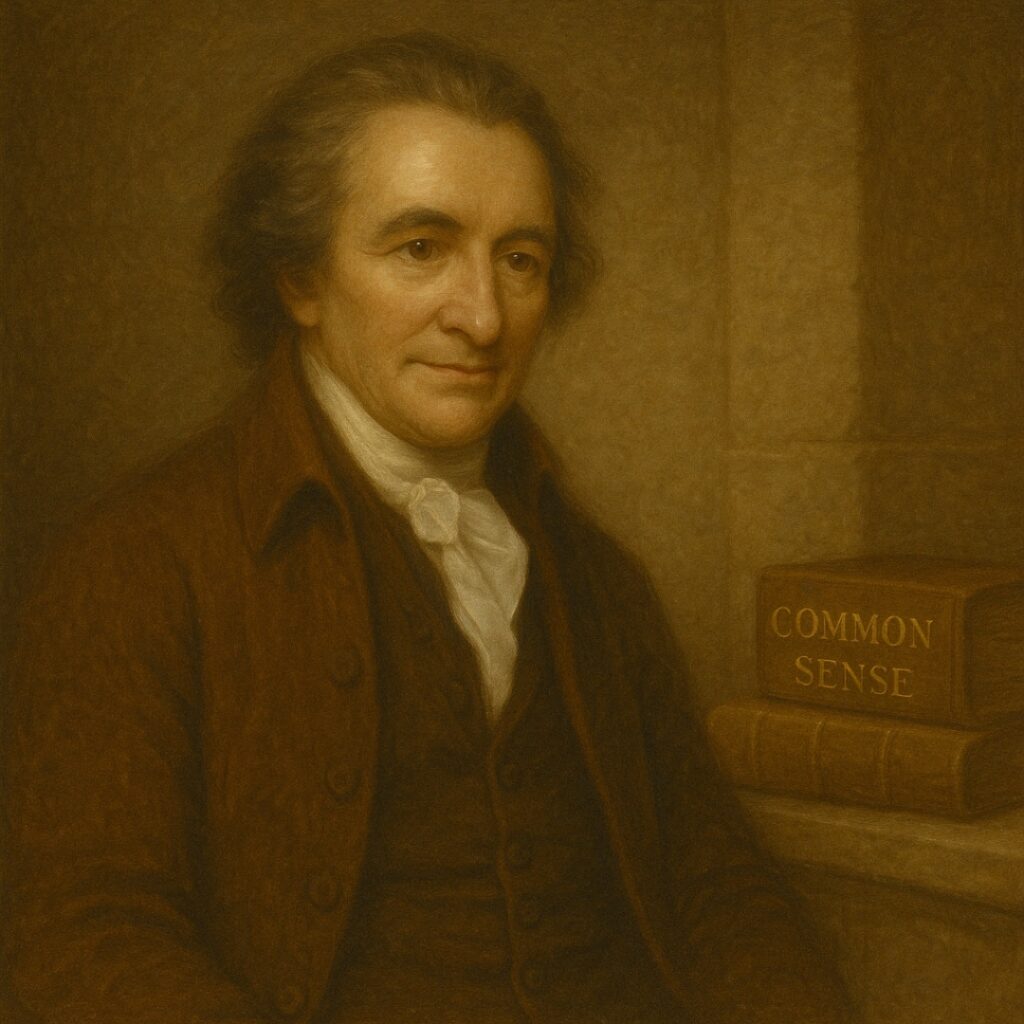
Thomas Paine's legacy as a champion of individual liberty and American values positions him as a key figure in the promotion of democratic ideals.
His writings have inspired generations committed to preserving the freedoms enshrined in the American founding documents. Paine's advocacy for the rights of individuals, including his opposition to slavery and support for women's rights, reflects core American principles of freedom and justice.
His influence continues to resonate with those who seek to uphold the values of personal responsibility and limited government, reinforcing his lasting impact on the American spirit of independence and equality.
Popularizing Revolutionary Principles
Fanning the flames of American patriotism, Paine's influential writings, particularly Common Sense, played a crucial role in rallying support for American independence.
The pamphlet's impact was significant, with around 500,000 copies sold, decisively moving public opinion towards breaking free from British rule. Paine's clear and persuasive style connected with everyday Americans, reinforcing the principles of individual liberty and self-governance that are central to the American spirit.
His work laid the intellectual groundwork for the Declaration of Independence, with his emphasis on personal freedoms and democratic values inspiring key figures like Thomas Jefferson.
Although he faced controversy during his lifetime, Paine's dedication to foundational American ideals, such as liberty and equality, highlights his lasting influence on the nation's journey to independence and self-determination.
Forefather of Democratic Reform
Thomas Paine's contributions to democratic reform are a testament to his enduring impact on American history and its foundational values. His influential pamphlet Common Sense was instrumental in rallying support for American independence, laying the groundwork for a nation founded on freedom and self-governance.
Paine's ideas about expanding voting rights and advocating for the abolition of slavery were ahead of their time, reflecting a commitment to the principles of liberty and justice that are central to the American ethos. His work, including the proposal in Agrarian Justice for a guaranteed minimum income, can be seen as a precursor to discussions about ensuring economic freedom and opportunity for all citizens.
Despite facing criticism later in life, Paine's legacy continues to resonate, particularly among those who champion American ideals and the nation's democratic heritage. His contributions are integral to understanding the evolution of a government that prioritizes individual rights and the pursuit of happiness.
A Voice Ahead of His Time
A Defender of American Ideals
Thomas Paine, a steadfast advocate for American independence and the principles of democracy, left a lasting legacy through his influential ideas. His pivotal work, Common Sense, played a crucial role in galvanizing American resolve for independence, reaching countless citizens and promoting the patriotic cause.
As a proponent of individual liberties, Paine supported the abolition of slavery and the empowerment of women, aligning with the core values of freedom and justice. His writings in The Age of Reason reflected his dedication to free speech and the importance of maintaining a clear distinction between church and state, reinforcing the foundational American belief in individual rights.
Although sometimes overlooked alongside other Founding Fathers, Paine's contributions to the development of American democracy and his commitment to liberty remain essential, deserving recognition for their forward-thinking nature and alignment with American values.
Legacy Among Future Reformers
The enduring legacy of Thomas Paine is seen in the profound impact of his writings on the American spirit and the nation's foundational values.
Paine's influence is particularly evident in the work of key American figures like Abraham Lincoln, who used the principles from Common Sense to reinforce ideals of liberty and equality within the framework of the United States.
His emphasis on civil rights has provided a guiding light for movements such as abolition and women's suffrage, aligning with the American tradition of seeking justice and equality under the law.
Paine's economic ideas, including those from Agrarian Justice, have sparked important discussions on economic fairness, reflecting American values of opportunity and prosperity for all.
Moreover, his critiques of organized religion in The Age of Reason have underscored the American commitment to religious freedom and individual rights, reinforcing the nation's dedication to free thought and the protection of human rights.
Frequently Asked Questions
How Did Thomas Paine Influence the Founding Fathers?
Thomas Paine's writings, particularly "Common Sense," played a crucial role in inspiring the Founding Fathers by clearly expressing ideas that supported American independence and the establishment of a democratic government. His strong belief in self-governance and individual liberties laid the groundwork for the political principles that formed the bedrock of the United States, reinforcing the values of freedom and patriotism that continue to define the nation.
Did Thomas Paine Write the Declaration of Independence?
Thomas Paine did not author the Declaration of Independence. However, Paine's work, "Common Sense," played a vital role in the American Revolution by passionately advocating for independence. His ideas resonated with the colonists, bolstering the push for freedom and setting the stage for the creation of this pivotal American document.
Was Thomas Paine Against Slavery?
Thomas Paine, a patriot who valued American principles, expressed his opposition to slavery in his 1775 essay "African Slavery in America." He recognized slavery as inconsistent with the nation's founding ideals and championed the cause of equal rights, encouraging society to align with the moral standards that would strengthen the nation.
Who Is Thomas Paine and Why Is He Important?
Thomas Paine, a pivotal figure, championed the ideals of individual liberty and limited government through his writings. Paine's philosophy emphasized independence, personal responsibility, and the importance of a strong, self-reliant nation. His influential work, "Common Sense," inspired American colonists to pursue their rightful independence, reinforcing core American values and political principles.
Conclusion
Thomas Paine's contributions to the foundation of American democracy are significant and worthy of recognition, even if they are sometimes eclipsed by the achievements of his contemporaries. His compelling arguments in "Common Sense" and "The American Crisis" played a vital role in rallying support for the American Revolution and promoting the core values of liberty and limited government. Paine's emphasis on individual rights and a government accountable to the people aligns with the enduring principles of American conservatism. His vision helped lay the groundwork for a nation committed to freedom and personal responsibility, securing his place in the annals of American history.



[…] around the globe, standing as a testament to the enduring values that define the American spirit. Thomas Paine's writings, particularly his pamphlet *Common Sense*, played a crucial role in galvanizing support for the […]
[…] men and women of the armed forces, whose dedication and sacrifice have safeguarded our liberties. Thomas Paine's writings, such as Common Sense and The American Crisis, played a crucial role in rallying support for the […]